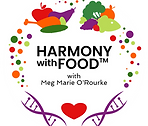Warning Labels Proposed For Alcohol. Why Not Warning Labels On Ultra Processed Food?
- Meg O'Rourke
- Jan 8
- 3 min read
Today we're going to talk about why there's a rise in colon cancer in people under 50. We're also going to talk about a study that says how fructose may contribute to obesity and cancer. We are going to dig a little bit deeper and talk about how they're talking about putting a warning on alcohol but aren't putting a warning on my on our food.
After reviewing the research and discussing these findings, it’s clear to me that we need to rethink our approach to warnings and education about the foods available to us. In early 2023, the American Cancer Society reported alarming statistics: in 2019, 20% of cancer diagnoses occurred in individuals under 55, which is nearly double the rate from 1995. The rates of advanced disease in people under 50 are also rising by about 3% annually. The same study projected that in 2023, there would be approximately 19,550 diagnoses and 3,750 deaths from colorectal cancer in individuals under 50. In response, a 2021 task force recommended lowering the starting age for colorectal cancer screenings from 50 to 45.

Cancer Rates in Younger Americans
Here’s my concern: Why are we stopping at age 45 when evidence shows that colorectal cancer rates are increasing in people in their 30s? The American Medical Association’s decision to lower the screening age to 45, while a step forward, feels like a half-measure. With objective data showing that colorectal cancer is rising among younger populations, why not introduce baseline screenings as early as 28? Alternatively, advancements in microbiome testing and emerging technologies like Cologuard could provide less invasive but equally effective early detection methods. However, there are obstacles, like insurance coverage, which often ceases if any abnormality is detected through non-invasive methods, requiring further procedures like colonoscopies. These are issues patients need to navigate while advocating for their health. I can help you navigate and advocate for your health. At Harmony With Food, we say test, don’t guess. Request your free call today.
We know that younger generations are increasingly impacted. While colorectal cancer is still most common in those over 65, the incidence in that age group is declining. In contrast, younger individuals are more likely to be diagnosed with advanced disease. Colorectal cancer has become the leading cause of cancer death in men under 50 and the second leading cause for women, after breast cancer. These diagnoses have profound implications, disrupting careers, causing financial strain, and affecting young families. Medical debt remains one of the leading causes of bankruptcy in the United States, exacerbating the burden on individuals already facing health challenges.
Warning Labels on Food?
The rise in colorectal cancer among young people prompts important questions about lifestyle, diet, and environmental factors. The American diet, rich in processed foods, high in fat, and low in fiber, could be contributing to this trend. Additionally, the over 3,000 food additives in the U.S. food supply—many of which lack thorough safety testing—might play a role. The average American consumes three to five pounds of these chemicals annually. Despite calls for warning labels on alcohol, where is the equivalent push for labeling harmful additives and chemicals in our food? These substances, alongside obesity, smoking, and other factors, are known contributors to colorectal cancer.
Connections Between Diet, the Gut, and Cancer
Emerging research continues to explore the connection between diet, the gut microbiome, and cancer. Fructose consumption, for instance, has been linked to obesity and cancers like colorectal cancer. In animal studies, diets high in fructose led to the elongation of intestinal villi, impairing nutrient absorption. Similarly, an imbalance in the gut microbiome—known as dysbiosis—has been associated with inflammation and increased cancer risk. Tests that measure gut microbiota and markers like short-chain fatty acids are becoming valuable tools for understanding these dynamics and tailoring prevention strategies.
Personalized nutrition represents an exciting frontier in preventive healthcare. By examining individual genetics, microbiome composition, and lifestyle factors, we can create customized strategies that address unique sensitivities and promote optimal health. Conventional medicine, while invaluable, often overlooks the role of nutrition and microbiome health in chronic disease management. Advanced testing in areas like blood, stool, and saliva analysis can provide a deeper understanding of food sensitivities, gut flora imbalances, and metabolic needs.
Be Your Own Healthcare Advocate
It’s time to take charge of our health by being proactive and informed. Whether it’s advocating for earlier screenings, understanding the chemicals in our food, or exploring personalized nutrition, we must prioritize long-term well-being. No one-size-fits-all approach will suffice—our health is unique, and our strategies should reflect that.





.png)























Comments